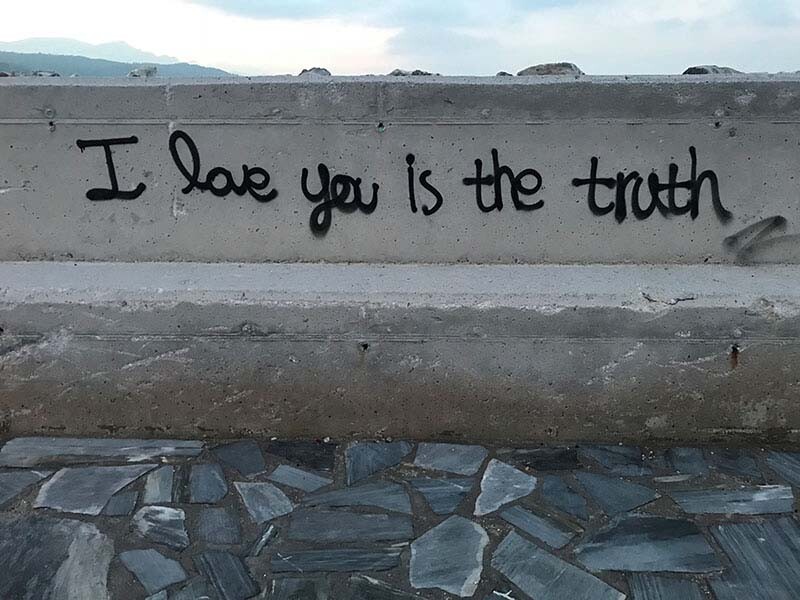
The following post was written by Global Gap Year Fellow Caroline Brogden.
Today I spent two hours transferring grocery bags filled with feces into larger garbage bags. Human feces. They hung from brambles, dripped from the sodden seams, and sat, fetid, merely feet from tents.
Never have I so willingly nor so easily “checked out.” In the span of two hours, I thought one thought and one thought only: I am picking up shit. I am picking up shit. I am picking up shit. I am –
It’s winter here in Samos, Greece, but my hair clung to sweat at the nape of my neck. My hands beneath two layers of gloves pruned and suctioned the latex to the tips of my frozen fingers. I was in the camp almost every day this week for kids’ activities, and familiar faces smiled cheekily at me, gesturing for gloves. A duo of some of my favorite boys, probably seven years old, followed me into the tall grasses to crush a never ending mountain of empty liter sized plastic water bottles.
When I arrived to the section of bush littered with feces – first identified by the thunderous buzz of frenzied flies and two exposed piles of diarrhea – I took one look at the boys’ open toed sandals and sent them back to the road.
“Thank you, my friends! Finished here.”
People throw away a lot of things. Lawn chairs. Beer cans. Molding cardboard. Expired easy-to-heat packaged meals, often with rotting peas that slosh around in the plastic container.
“Throwing away,” is loose but literal terminology, because in reality, there is nowhere to put the garbage. In the overspill tent area of the camp where thousands of people live in summer beach tents has no sophisticated waste collection system. The lawn chairs, beer cans, pea packages, cardboard, and bags of shit are literally thrown from the tents into the grass. Everyone generates waste, but I know mine will be removed without any real conscious effort; it takes little to no problem solving abilities to tie the yellow drawstrings and lug the plastic bag to a container next to my house. It is yet another privilege unearthed on my gap year.
I thought only, “I am picking up shit,” but I heard choruses of, “Hello, my friend,” and, “Very good! Thank you!” What do the people who don’t shout encouragement think? What do they see when I’m a contortionist in the trees, sprawling to grab as many potato chip bags as I can in both hands?
And what do they think when I tell them “no?”
Because today I had to say a lot of no’s. The community center where I spend most of my time is part of the only organization offering psychosocial support for refugees on the island. In conjunction with an official organization, we hosted a cooking activity during the few hours on Saturday afternoons where the center transforms into a women-only safe space. By contrast, Monday through Friday it is overrun with hundreds of boisterous men playing chess, attending classes, and drinking tea. While this is undoubtedly a positive atmosphere, it’s obvious even in the way the women sink into the reception chairs how the absence of men in otherwise unfathomably stressful living conditions fosters a unique tranquility. Or, in some cases, uproarious delight.
This Saturday, however, was different. Three times the number of women that usually attend arrived, anticipating food. What began as a joyful celebration of cooking for each other – I was invited to join several selfies – became mayhem after a series of crucial miscalculations. The organization hosting claimed total responsibility and apologized profusely, but the afternoon escalated rapidly. There wasn’t enough food for everyone. Children, who were not allowed to go upstairs where food was being prepared, scrambled over the wooden gate at the base of the stairs. Thus began the naysaying.
“No, no babies upstairs. Only mamas.”
“No, no more knives. Finished.”
“No my friend, please sit down.”
Plates started filtering from the kitchen into the reception area, but with no reliable way to know who had received a plate and who had not, the organizers in charge directed distribution to the door. Women and children mobbed the doorway, shooting their hands out and grabbing plates and shoving past the women with whom they’d just danced. Indignant murmuring and fluorescent lights flooded the lobby. I stood at the door, trapped between the frustrated crowd inside and the increasingly impatient crowd outside, mainly men and boys, thrusting their heads in the door frame.
“No, women only.”
I wanted to cry. A feeling I’d experienced only the day before resurfaced. I’d been at kids’ activities handing out balls of play dough when one child snatched a ball from the Tupperware and chaos erupted. These were the same children that throw their hands in the air for the Hokey Pokey and look to me when they forget the lyrics. They tap my shoulder and blush when I praise their beautiful, creative drawings, and they shout their names at me with pride. The same children that count in unison when I read One Gorilla and run to greet me with spine crushing hugs. But in that instant, I was intimidated by their abrupt aggression, which was unlike the playful, normal childlike behavior they exhibit typically. The Tupperware was yanked from my grasp as they began to pelt one another.
“No, my friend. Ali Baba no good here.”
At the door, I checked out again. This is a shit storm. This is a shit storm. This is a shit –
And then, for 30 seconds, the atmosphere shifted. A fellow volunteer coming inside from another activity squirmed through the door’s narrow opening and, upon witnessing the clamor before us, started making silly faces at the baby in the arms of the mother smushed against my side. The women around us softened. We giggled as J wiggled her nose, and the mother stroked her baby’s cheeks.
Eventually, every woman that stuck it out in line left with something, though not what was promised and not enough for every member of her family. What is meant to be a safe, calm space became a microcosm of camp realities. Women who’d cooked attempted to leave with entire pans of food as their peers took bite sized pastries meant to pacify, and thankfully, another volunteer delivered the stern “no” I was too overwhelmed to say aloud, much less justify. Of course it wasn’t fair for some women to take home more food, but how could I possibly communicate that to women who just wanted to eat?
I sing the highest praises to the impressive team of women working in the center today that shared the burden of giving “no’s” that prevented violence but left a sour, heartbreaking aftertaste. When I called my dad in flustered tears, I articulated how deeply disturbed I am by the inherent power dynamic of giving “no” and receiving “no.” There I was, an 18 year old white girl from America, looking directly into the eyes of women twice my age with five children clinging to their dresses and saying, “No, you cannot *insert action here*.”
Instating and upholding rules is how the community center is able to operate smoothly in perpetuity; it’s how it’s garnered a reputation of being an equitable, fair, and safe space. But how many times a day must its beneficiaries hear “no,” and how infuriating and patronizing does it sound coming from my privileged lips? To make it worse, I’m communicating in my native language. I have the choice to give “no.” I have ownership. Power. Receiving “no” utterly lacks that. That’s my darkest privilege unearthed, and it reeks.
I have written about and want to share the aspects of my experience here that fill me to the brim with pride in being human. Today was more affecting than affirming, and I feel more distressed than proud. To witness in real time the ramifications of grave injustice, like denying people their basic human rights, is devastating. I came to learn more about the human condition, and learning I am.
I’ll end with a final “no,” though, one that I squealed in protest as I was dragged onto the dance floor by persistent teens. (Listen to the audio here.) Their response to my awkward, fumbling hip shaking? “Yes, yes, yes!” Never saying “no” to that ever again.
